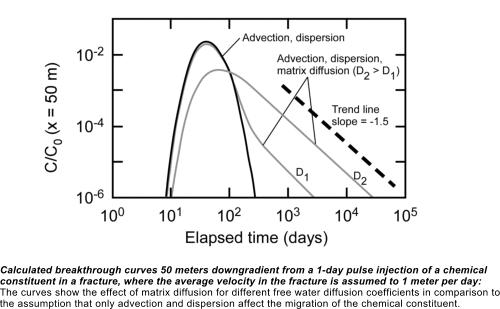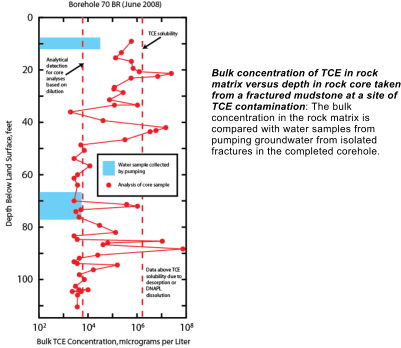ADVANCES IN THE FATE, TRANSPORT, AND REMEDIATION OF GROUNDWATER CONTAMINANTS IN FRACTURED ROCK:
Evaluating the Significance of Matrix Diffusion
Despite our knowing that groundwater moves primarily through fractures in bedrock systems, fractured rock is also characterized by its primary porosity (often referred to as the rock matrix). The primary porosity does not contribute significantly to groundwater flow, but it acts as a fluid filled void space in contact with the groundwater in the adjacent fractures. Through the process of diffusion, contaminants can diffuse from fluid in the fractures into the fluid in the rock matrix, or vice versa, depending on the direction of the chemical gradient.
Learn how persistent contamination during long-term ground water pumping at fractured rock sites may be related to matrix diffusion.
Ground water diffusion into and out of the rock matrix is a key attribute for measuring the distribution of contaminants in the subsurface and the longevity of contaminant residence times. Diffusion affects the time frame of remediation, its cost, and likelihood of achieving project objectives.
It is not uncommon to experience persistent contamination at fractured rock sites that have been subject to long term pumping.
In fractured rock aquifers, groundwater moves primarily through fractures; however, fractured rock is also characterized by a primary or intrinsic porosity of the rock (often referred to as the rock matrix).
Learn the key chemical transport processes in fractured rock aquifers and the parameters that control the magnitude of matrix diffusion and the significance of matrix diffusion in the design and implementation of commonly used remediation technologies.
Discover the role of matrix diffusion and how it is a critical component of characterization, monitoring, and remedial operations at sites of groundwater contamination.
This webinar offers an overview of chemical transport processes in fractured rock aquifers and provides an understanding of the parameters that control the magnitude of matrix diffusion and the significance of matrix diffusion in the design and implementation of commonly used remediation technologies.
The processes and phenomena discussed in this webinar also have applicability to sites of groundwater contamination in unconsolidated porous media that are subject to fracturing or are characterized by large contrasts in the hydraulic properties. Fractured tills and depositional environments where low permeability clayey materials are interbedded with more permeable sands and gravels are examples of unconsolidated porous media where diffusion will play a role in the fate, transport, and remediation of contaminants.

Highlights of the webinar include discussions of:
- the hydrogeologic complexities associated with fractured rock aquifers, including igneous and metamorphic rock and sedimentary and karst aquifers
- an overview of chemical transport processes in fractured rock with emphasis on the role of matrix diffusion in the spatial distribution of contaminants
- characterization and monitoring contaminant distribution in fractured rock aquifers to identify the magnitude and extent of contamination
- defining site conceptual models appropriate for characterizing contaminant migration and designing remediation technology
- the significance of matrix diffusion in the application of commonly employed remediation technologies applied to contaminated groundwater in fractured rock aquifers
Participants in this webinar will technically benefit from this webinar by:
- recognizing the significance of matrix diffusion in designing site characterization and monitoring protocols in fractured rock aquifers
- recognizing the limitations of remediation technologies in their application to fractured rock aquifers
- introducing participants to methods of sampling and analysis used to characterize the chemical concentrations in the rock matrix
- providing participants with summaries of key tools, articles, and other resources that are pertinent to the interpretation of chemical transport and matrix diffusion in fractured rock aquifers

"All the webinars that I ordered were excellent, taught by high quality instructors. Each one addressed some (important technical) gaps. 'Advances in the Fate, Transport, and Remediation of Groundwater Contaminants in Fractured Rock: Evaluating the Significance of Matrix Diffusion' presents KEY information on a topic important for estimating the length of time groundwater contaminate cleanup may require."
- William Ford, Geohydrologist, Federal Agency
Instructors Bio
Allen M. Shapiro, Ph.D
U.S. Geological Survey
 Dr. Allen Shapiro has authored numerous papers on field investigations in karst and various types of fractured rock aquifers, including investigations of chemical transport and matrix diffusion. Dr. Shapiro has also been active in the development of methods of quantifying properties that govern groundwater flow and chemical transport in fractured rock aquifers and he has patented equipment to conduct aquifer tests and monitor groundwater chemistry in fractured rock.
Dr. Allen Shapiro has authored numerous papers on field investigations in karst and various types of fractured rock aquifers, including investigations of chemical transport and matrix diffusion. Dr. Shapiro has also been active in the development of methods of quantifying properties that govern groundwater flow and chemical transport in fractured rock aquifers and he has patented equipment to conduct aquifer tests and monitor groundwater chemistry in fractured rock.
Dr. Shapiro is a Senior Research Hydrologist with the National Research Program (NRP) of the U.S. Geological Survey (USGS). His research has focused on the development of field techniques and equipment, and methods of integrating and interpreting geologic, geophysical, hydraulic, and geochemical information in the characterization of fractured rock aquifers. Dr. Shapiro has described fundamental processes of ground water flow and chemical transport that are unique to geologic environments characterized by significant heterogeneity. He has also investigated the effect of scale on the hydraulic and transport properties of fractured rock through carefully designed field testing and modeling investigations conducted over physical dimensions of meters to kilometers. Dr. Shapiro is currently active in the characterization and remediation of various contaminants in fractured rock, including groundwater contamination by Dense Non-Aqueous Phase Liquids (DNAPLs).
Dr. Shapiro was the 2004 National Ground Water Association (NGWA) Distinguished Darcy Lecturer and is an associate editor of the journal Ground Water, and he holds a Ph.D. from Princeton University in Civil and Geological Engineering.